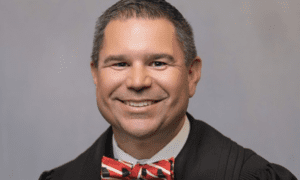Visiting Appeals Court judge overturns jury decision, citing Down Syndrome victim’s behavior
A Georgia Court of Appeals judge has come under fire for setting aside a jury’s guilty verdict in a local rape case he presided over in September 2012, the first criminal trial he had ever conducted.
In early January, Appeals Court Judge Christopher J. McFadden ordered a new trial for defendant William Jeffrey Dumas, who was convicted of two counts of rape and one count of sodomy. Dumas was sentenced to the minimum of 25 years in prison.
McFadden presided over the Fayette rape trial instead of a local Superior Court judge, the first time the jurist had ever wielded the gavel in a criminal jury trial. He reportedly had experience in civil court actions before winning a spot on the state’s second highest court.
McFadden, in a lengthy order justifying his decision, said the victim’s testimony was inconsistent and cited the lack of evidence that she “exhibited visible distress” in being around the defendant immediately following the alleged rape incidents.
“At no time prior to her outcry … did (the victim) behave like a victim,” McFadden wrote. “Nor did Mr. Dumas behave like someone who had recently perpetrated a series of violent crimes against her. … It requires more than that bald argument to satisfy this court that it should ignore the fact that, until the outcry, neither of them showed any fear, guilt or inclination to retreat to a place of safety.”
Aggravating emotions in this case is the fact that the victim, a 24-year-old Fayette woman, suffers from Down Syndrome.
After initially declining a request to recuse himself from the case, McFadden on Friday withdrew from the matter. But that leaves a strong likelihood that a new trial will commence regardless, since it is unlikely that decision can be appealed, said District Attorney Scott Ballard.
McFadden ultimately decided to “be an activist and overturn a jury verdict for no other reason than you don’t believe the victim acted like a victim and that he didn’t act like a rapist,” Ballard said.
Ballard said the victim cried after hearing the judge’s decision, but then she composed herself and decided to pursue a new trial.
“It was very hard for her to testify the first time because she didn’t want to even be in the same room where he was again,” Ballard said.
Pending the new trial, Dumas is out of jail on a $50,000 bond, wearing a GPS ankle monitor to track his whereabouts with an order to stay out of Fayette County and avoid contact with any of the victim’s family.
McFadden’s new trial order specifically notes that the victim during her initial outcry about the alleged rapes first said she was kidding and then claimed she wasn’t.
McFadden also writes that he doubts one of the rapes could have been committed, as the victim alleged, on an elevated bar chair or on a rolling task chair.
McFadden also criticized Ballard’s closing argument for mischaracterizing the findings of a medical doctor who examined the victim and said her findings were consistent with forcible rape, but not necessarily proof of it.
“On the contrary, she readily acknowledged on cross examination that her findings were also consistent with other explanations which could exclude forcible intercourse,” McFadden wrote. “So, while it is fair to say that this evidence corroborated the testimony that penetration occurred during the 12-hour period in question, the state’s argument greatly overstated the significance of Dr. Louman’s testimony.”
McFadden also raps Ballard for raising his voice during his closing argument in an “emotional appeal” that “may have been unduly prejudicial because the nature of the charges engendered an emotional intensity, apparent to the court during the jury selection process, that never dissipated.”
“That emotional intensity might have interfered with the jury’s ability to address the concerns set out above,” McFadden wrote.
Ballard’s office had argued that since McFadden used the privilege of sitting as the “13th juror” in overturning the jury’s ruling, McFadden has already sat in judgment of the case and must recuse himself.
Ballard said he has never seen a judge reverse a jury’s decision in such a manner.
“I think the legal community was stunned by what he did,” Ballard said.











Leave a Comment
You must be logged in to post a comment.